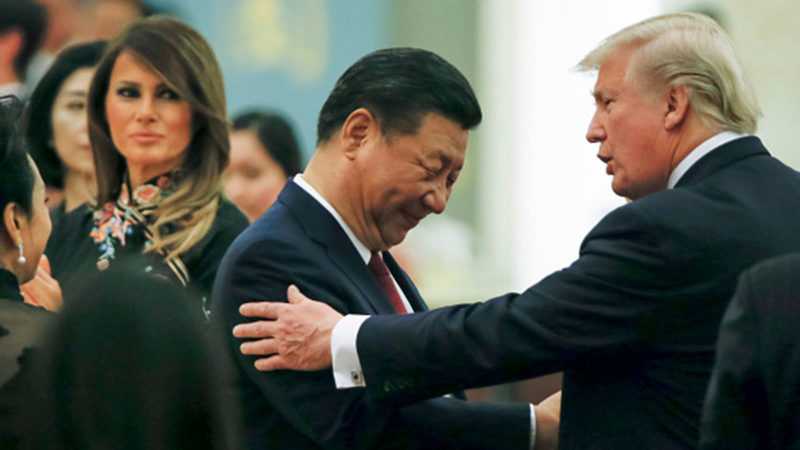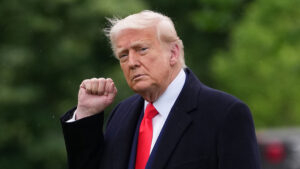US-China trade war will impact economy, but investors shouldn’t worry too much says expert

China's leader Xi Jinping with President Trump in happier times. Pic: Getty
US investors shrugged off the escalating US-China trade war overnight, amid a warning from ratings agency Moody’s that the tension would be “material for the global economy”.
Overnight China hit back at the US with a fresh series of tariffs less than 24 hours after President Trump announced new tariffs on $US200 billion worth of Chinese goods, knocking the trade war between the two nations up another gear.
US stocks rallied overnight amid a view that the situation could be worse — though some commentators were warning investors not to be over-confident.
Ratings agency Moody’s warned: “Higher tariffs will hurt the economy by distorting prices and creating inefficiencies globally. Companies that rely on global supply chains will likely hold off investment decisions given the uncertainty around tariffs.”.
Outlook for local resources sector
Yesterday’s move by the US sent local mining stocks lower, with the ASX metals and mining index falling about 0.5 per cent on Tuesday.
But Westpac chief economist Justin Smirk told Stockhead any bearish investor sentiment on the outlook for Australian mining stocks was overdone.
“Right here, right now I would argue that the impact on some of our major exports — like coal and iron ore, for example — is minimal; and we are probably [enjoying the benefits] of a lower Australian dollar,” Mr Smirk said.
The Australian dollar has fallen from 81c to about 72c against the US dollar since late January; a lower Australian dollar usually results in higher revenues for mineral exporters.
“It will be different for different companies — depending on their export mix — but with the combination of certain commodities being better supported [in China] and the weaker Australian dollar you could potentially see some outperformance,” Mr Smirk said.
“What would be a negative would be if this trade war extends to other countries; that would be much more damaging, and you would have to start thinking about its broader impacts.”
The modelling in KPMG’s August report Trade Wars: there are no winners, shows that the negative impact of a trade was would be kept to less than 0.5 per cent of world Gross Domestic Product (GDP) if the trade war was contained to the US and China.
GDP is the sum of the prices of all final goods and services produced in an economy during a period of time.
But if other countries entered the trade war it escalates, and world GDP was likely to contract by more than 3 per cent — causing a major downturn in the global economy.
But Mr Smirk said at this point it looked unlikely.
“It’s more about constrained growth in both the US and China; you wouldn’t form a base case that we are looking at a broader trade war,” he said.
“Not a zero probability, but very low.”
- Subscribe to our daily newsletter
- Bookmark this link forsmall cap news
- Join our small cap Facebook group
- Follow us on Facebook or Twitter
Peter Wright, executive director of Bass Metals, said the tariffs were “no worry for us at all”.
Graphite and lithium player Bass Metals (ASX:BSM) is making money from its Graphmada large flake graphite mine in Madagascar, and recently made a high-grade lithium find at its Millie’s Reward project that sent its share price up almost 17 per cent.
“We don’t think it changes the amount of graphite consumed, I think it just changes the composition of where that graphite may go,” Mr Wright told Stockhead.
“It’s been announced for a fair while, and we haven’t seen a big change in price.“
CRU on how the #TradeWar may impact the #lead concentrate market from China's perspective – China is proposing a 10% retaliatory tariff on USA metal concentrates, which is a large supplier! – Further confirms the need for our high-value high-grade Abra concentrate! $G1A $G1A.AX pic.twitter.com/7s6fUGcJrB
— Galena Mining (@GalenaMiningASX) September 18, 2018
Galena Mining chief Alex Molyneux told Stockhead that while this latest round of tariffs added to general volatility around global trade, it did present opportunities for Australian exporters of metals and metal concentrates to China, in the event China seeks to reduce these imports from the US.
Galena is looking to develop its mammoth Abra lead mine in WA, which could be in the top 6 globally once it reaches full production.
UNLOCK INSIGHTS
Discover the untold stories of emerging ASX stocks.
Daily news and expert analysis, it's free to subscribe.
By proceeding, you confirm you understand that we handle personal information in accordance with our Privacy Policy.








